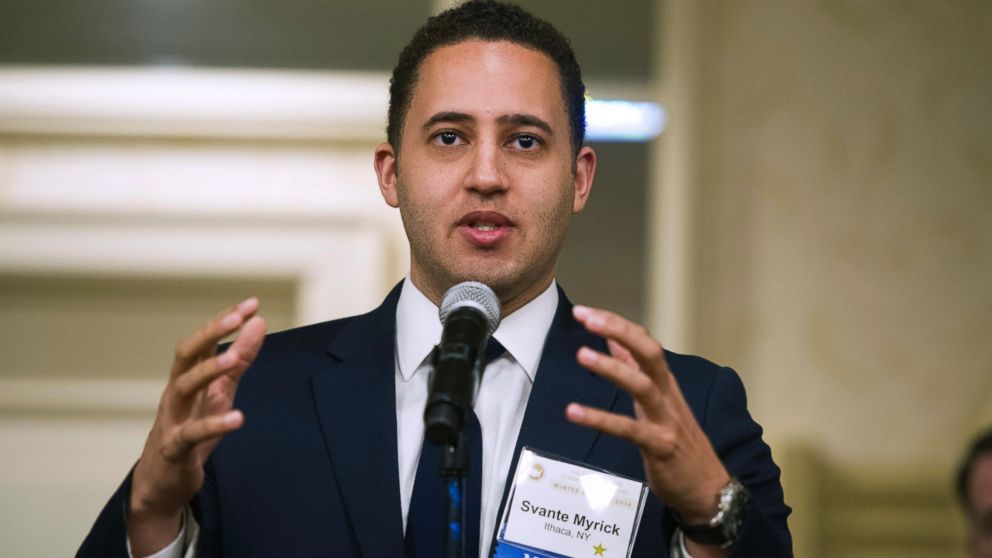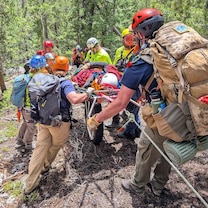Ithaca Unveils Radical New Strategy to Combat Intravenous Drug Use
Ithaca mayor outlined possible "safe" space for intravenous drug users.

— -- The town of Ithaca, New York, is contemplating the creation of "safe" spaces for drug users, highlighting how some authorities are working to battle drug use by viewing it as a public health threat rather than simply an illegal act.
Mayor Svante Myrick announced on Tuesday he would consider a "supervised injection facility" where patients can safely inject drugs under clinical supervision as part of his multi-point plan focused on addressing drug use in Ithaca. Myrick is expected to unveil more details of the plan at a news conference today.
The plan "is rooted in public health and harm reduction principles" and "aims to prevent drug use and sales, reduce overdose deaths and infectious disease, decrease rates of incarceration, expand access to treatment, and save taxpayers money," Myrick said in a statement on Tuesday.
Myrick said he looked to European policies to find a new way to treat users in a more holistic way.
"While much of drug policy is driven at the state and federal level, there is a great deal that municipalities can do to create more effective drug polices," Myrick said. "Given the way that drugs and drug policies are harming our community, I know we need a totally new approach."
Myrick's plan highlights how officials are looking at "harm reduction" policies to save lives as opioid and intravenous drug use continue throughout the U.S. Policies such as needle exchange programs have been around for decades in the hopes of keeping drug users from transmitting HIV or hepatitis through dirty needles, but experts said this center in Ithaca could be part of a larger movement promoting harm reduction.
Other parts of the plan include creating a 24-hour crisis center, using police to get people into treatment and consider heroin-assisted treatment for those who have failed other drug treatments such as methadone.
Dr. Christina Delos Reyes, an addiction psychiatrist and director of the Addiction Psychiatry Fellowship at University Hospital Medical Center in Cleveland, said other countries, including Canada, have used these supervised injection facilities to help drug users.
"This is for people who have consistently failed every other treatment available," she told ABC News. "People need to understand what a deep-end treatment this is."
Delos Reyes said there are signs that lawmakers are moving to view addiction as a public health problem rather than a legal problem, but that views on addiction move "slowly," pointing out it wasn't until December that federal authorities lifted a ban on funding needle exchanging programs.
"The bottom line is we have to start looking at this as a public health problem instead of as a crime and moral failing," she said. "We’re not there yet. We're getting there."
Daniel Raymond, policy director for Harm Reduction New York, said if Ithaca's policies work, it could mean seeing similar programs spread throughout the country.
"We tried to elevate our collective response to heroin and opioids but no matter how much we expand our prevention efforts and treatment efforts, we’re still not keeping pace with the toll," he told ABC News.
The group has also seen more focus on harm reduction policies that move beyond needle-exchange programs, Raymond said, noting that a growing number of police departments have been combating overdoses by using Naloxone, a drug that counters the effects of an opioid overdose.
"In the past two years, police departments across New York and across the country have also gotten trained and equipped," in using Naloxone, Raymond said.
Kassandra Frederique, New York State Director at the Drug Policy Alliance, assisted with developing Ithaca's plan. She said there's a potential for Ithaca to cause a "domino effect" in other U.S. cities in terms of how authorities deal with drug use.
"Harm reduction should be the foundation of the way we look at policies around drugs and people who use drugs," she said. "What is our main objective is it to get people to stop using drugs or is it to get people to a healthier life?"




